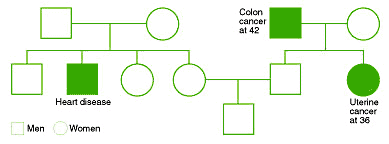| Glossary of Terms | |
| List of Registries |
| Disclaimer |
 |
Marge Pearson, R.N. |
|
|
Summer is often the time of year for family reunions and visiting relatives. As more and more people become interested in researching their family history, these gatherings are often wonderful opportunities to gather information about your family history. An indication of the popularity of researching family histories is the burst of genealogical resources that have been developed. The Internet has over 41,000 sites for family history research. One benefit of tracing your family's past is finding out about your family's medical history. This in turn may help you track the history of cancer in the family or determine whether there are factors increasing the risk for heart disease, diabetes, and other conditions in your family. The results of your search can provide you and your family with information your doctor and genetic counselor can use to determine what types of screening or preventive measures may benefit you. To be most useful, however, this information needs to be as detailed and accurate as possible. Unfortunately, tracking down past family medical information is not always easy. Therefore, in this article I will give some steps that will help get you started. Step 1: Make a list of your relatives, leaving some space between each line of information. This will give you a good starting point for your search. Genetics professionals often put this information into a picture form called a pedigree. This helps keep track of who is in the family, and how they are related to each other. There are websites and software programs available that can provide forms you can use to organize this information.
Step 2: Contact family members. Some families have individuals who tend to be the keepers of family history. They may be the person who plans family gatherings, and they can be very helpful. If you can locate such a person in your family, start your search by calling them. They probably already know a lot of the information you need. Some families also have a family Bible or other heirloom in which family information has been recorded and passed down. If there are no sources like this in your family, you may need to contact different people before obtaining the information you need. Faxes, letters, e-mails or phone calls can be used to ask other family members for information. Different families like different methods. People-finder search engines on the World Wide Web can help track down family members whom you have lost track of. The questions that need to be asked about each person on your list are:
Finding the answers to these questions will not always be easy. Different family members may remember things differently. It may be necessary to obtain copies of medical records to sort out incomplete or conflicting information. Written consent is needed to access someone's medical records, and if a person has passed away, their next of kin will need to give consent. The next of kin is usually a spouse, or if the spouse is also deceased, an adult child. Your doctor, nurse or genetic counselor can tell you if this medical information is needed and help you obtain the necessary medical records. Death certificates, which are available at county courthouses, can also provide useful information. However, death certificates only indicate the cause of death and do not include information on other underlying medical problems that a person may have had. Though researching your family history will be a big job, what you learn may reveal interesting facts about your heritage, but more importantly, it may uncover critical information about your family's medical history.
|


